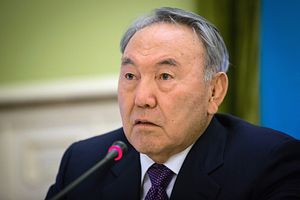A few days ago, Catherine Putz ably summed up a recent International Crisis Group report on the current state of political affairs in Kazakhstan. While she examined the role Kazakhstani President Nursultan Nazarbayev played in centering the nation’s body politic, the report also offered a nice look at some tangential realities with which Kazakhstan is currently dealing.
The report, as it is, follows on the heels of a lengthy 2013 look beyond the façade of stability and economic expansion. Indeed, the newest report comes to many of the same conclusions Crisis Group found two years ago; that is, “Kazakhstan is institutionally weak, overly dependent on a leader with no clear succession plan and riven by uneven social and economic development.”
Of course, much has changed over the past two years – arguably the most eventful 24-month stretch the post-Soviet sphere has yet known. An economic crunch roils the region, pairing a collapse in hydrocarbon costs with a beleaguered ruble dragging down regional currencies. Russia’s economic slump – now set to stretch into 2017, per the European Bank of Reconstruction and Development – continues to dry job prospects for migrant laborers, with Kyrgyzstani and Tajikistani governments showing little inclination to provide a reprieve for the jobless. All the while, Russia continues to ransack eastern Ukraine, funneling supplies and troops to the Donbas, cementing its occupation of the Crimean peninsula. As one Western diplomat noted about Kazakhstan, “Times have changed dramatically in twelve months, it’s a completely different geopolitical world.”
It’s in this atmosphere that Crisis Group revisits its outlook for Kazakhstan. And while select Western visitors sing praises for Kazakhstan’s autocracy, Crisis Group finds a country far less at ease – politically, economically, inter-ethnically – than it would like to advertise. (In the interest of disclosure, I worked for Crisis Group in 2014.)
To be sure, there still appears little likelihood Russia may opt to repeat a Ukraine scenario in northern Kazakhstan in the immediate future – or at least as long as Nazarbayev remains in power. Nonetheless, Russia’s Ukrainian invasion unsurprisingly appears to have altered Kazakhstan’s view of its northern neighbor. “Moscow appears to be seeking to reassert dominance with regard to all states that were once in the former Soviet Union; its use of force and propaganda in Ukraine are red flags to Astana,” the report reads. “At best, Russia is now viewed as dangerously unpredictable.” As a Kazakh analyst noted, “[If] previously Kazakhstan perceived Russia as a big brother that will come to help when needed, now that perception has changed. Kazakhstan is very skeptical. Events in Ukraine show you have to be prepared for anything.”
Nevertheless, Russian officials interviewed appear still to back Nazarbayev’s presence in Astana – although with language that may leave Kazakhstan’s leadership tilting its heads. As the report reads, a “Russian diplomat described Nazarbayev as a ‘proven friend’, albeit one with the ‘mentality of an Oriental bazaar’.” Russian support for Nazarbayev’s continuance in power isn’t necessarily surprising. Not only does Nazarbayev’s presence prevent any Kazakh proto-nationalist from assuming power – Nazarbayev enjoys significant measures of support from ethnic Kazakhs and ethnic Russians alike – but he has also overseen one of the few governments to publicly acknowledge Russia’s “annexation” of Crimea. Notably, Western officials interviewed shared Russia’s assessment of Nazarbayev’s place at the head of government: “[W]e hold our noses [at Nazarbayev’s recent electoral victory], but it’s not the first time we have done that for the sake of the broader good, or the broader not so good,” one official said. “With the exception of some NGOs, no one thinks it is a good idea to replace him.”
Still, Nazarbayev’s presence is far from the panacea needed to solve the country’s myriad issues. Nor has it been enough, as the report finds, to prevent the continuing backslide on ethnic issues. Per the report, “some observers believe it would take ‘just a spark’ to ignite interethnic tensions, particularly among the young.” (According to a human rights activist in northern Kazakhstan, “Inter-ethnic fights happen regularly. The police only take away Russian [youth].”) The complaints from the ethnic Kazakh majority run largely cultural and linguistic; the complaints from ethnic minorities, especially ethnic Russians, range from economic to chauvinistic. Ethnic Russian citizens have, among other things, told me following the Ukrainian invasion that Moscow was not a foreign government, and that “[Kazakhstan] is as much a country as ‘Durka-Durkastan’ from Team America.” The Crisis Group report highlights this burgeoning split:
“[Kazakhstan should] exercise restraint on sensitive language issues (such as substitution of Kazakh for Russian place names) and promote ethnic diversity at all layers of government; encourage Russians to integrate and learn Kazakh … and create conditions for public discussion of ethnicity and citizenship lest these issues be hijacked by malcontents, Kazakh or Russians nationalists or outsiders[.]”
Whether Kazakhstan takes these recommendations at their face, or if the government continues forward without any changes, remains to be seen. Regardless, if the government opts for the latter course – and if the next two years are anything like the previous two – there’s far less likelihood the stability so craved by Astana can survive as it has. The Kremlin has made its revanchist desires clear. Whether or not Kazakhstan can continue to maintain its detachment, and its stability, remains to be seen.































